I made this because I got poetry brainrot.Periodically active. Call me Thistle, all pronouns. Main is @trans-witch-cauldron
Don't wanna be here? Send us removal request.
Text
everything u need to know about me can actually be explained by the fact that i read that poem about the serving girl wearing the pearls so they're warm for her mistress when i was like 11 and it rewrote my brain chemistry forever
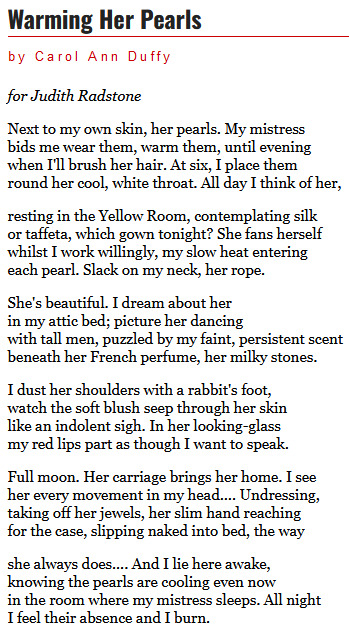
like this Changed Me
61K notes
·
View notes
Text
I think winter teaches us to see beauty in hard places. It’s easy to find green trees and blooming flowers beautiful. And the turning of seasons in some ways teaches us to appreciate that fleeting beauty. But winter is beautiful too. She isn’t as forgiving, or vibrant, but there’s loveliness in clean snow-blanketed landscapes, in iced over ponds and barren trees. There’s beauty in hard places. Winter shows us that.
968 notes
·
View notes
Text

2.0- the guardian and the searcher (vi, cait)
1K notes
·
View notes
Text
With @staff 's recent post saying 1/4 of this site is LGBTQ going around, I'd like to see what the actual demographic is
So!
Please reblog for bigger sample size!
71K notes
·
View notes
Text
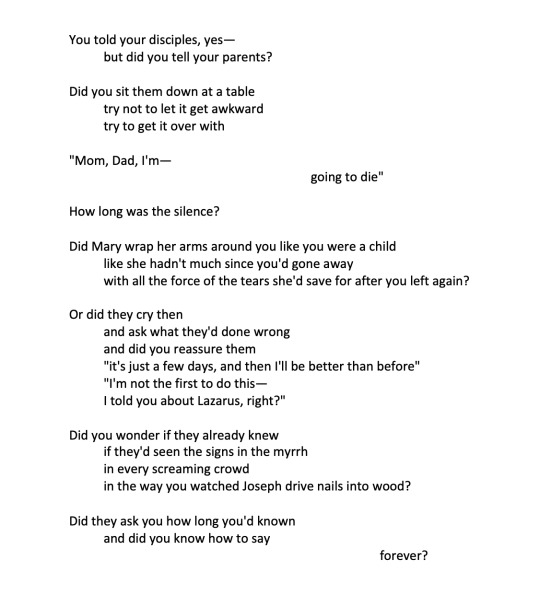
[writes about Jesus but it’s actually about being trans] [writes about being trans but it’s actually about Jesus]
29K notes
·
View notes
Text
Still making my way through My Vocabulary Did This To Me. I think a lot of it is going over my head— especially with all the Dadaism. But there’s something to that, no? Something very human about understanding that maybe I’m not meant to understand a poem, and trying anyways.
1 note
·
View note
Text
The Last Goddamn Cripple
(written by Casey Sabine (that's me!) and originally published by the Santa Fe Writer's Project Quarterly here)
i walk down the cobbled streets
cane thud-thud-thud-ing
with every other step.
it’s a beautiful thing,
ebony wood
with a handle carved from marble.
heavy.
grounding.
thudding.
it’s gorgeous,
so when they stare
i can tell myself
it’s in awe—
not confusion
or disgust
it’s heavy
so i can tell myself
that it doubles as a weapon—
if they ask me about the surgery
i can take out their knees.
but still,
my cane catches a stone wrong,
slips out from under me,
knees buckling with sudden weight,
ankle twisting,
and my hip making its sickening pop
but i manage not to scrape anything up
and for just a moment,
while i’m splayed prone on the road,
i wonder
why haven’t i
had that surgery?
it’s more of a transplant,
(which i suppose is a surgery of sorts)
of the consciousness
into a brand new body.
a fixed body, a right body,
a body as it should be
not like this,
broken, ruined, fragile thing.
but why would this body,
the one i was born in,
the one i grew up in,
not be a body as it should be?
if this was not mine, was not made for me,
then why is it here in the first place?
why am i here in the first place?
and as i lift my body back off the stones,
hoisting my aching self upright,
people staring
(again)
and whispering
(again)
i think that the surgery is more than
just a transplant.
it would cut away a piece of me,
a part of my life, my history, my identity—
and my cane.
my beautiful,
lovely,
hand-carved,
ebony-and-marble
cane.
and for what?
your comfort?
if i’m the last goddamn cripple alive,
that’s fine.
but i’ll never have that fucking surgery.
50 notes
·
View notes
Photo
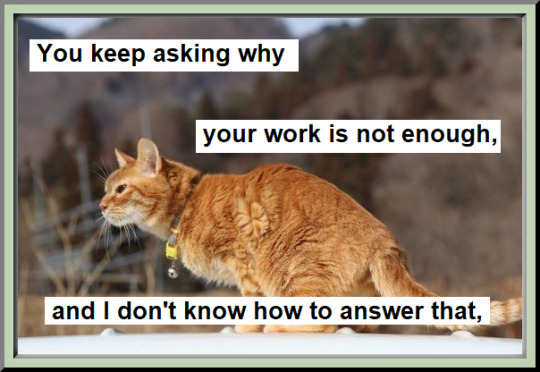
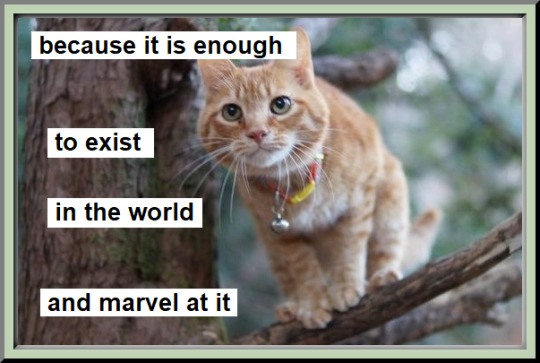

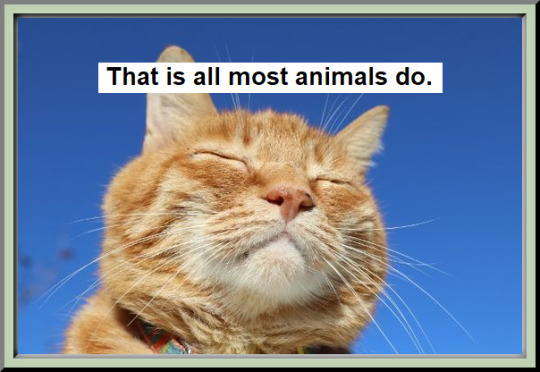
- A Psalm for the Wild-Built, Becky Chambers // kagonekoshiro
146K notes
·
View notes
Text
We need to start sexualizing mobility aids
24K notes
·
View notes
Text
Been reading a lot of Jack Spicer lately, making my way through a book of his collected poetry. Here is a longer poem I like:
The Scrollwork on the Casket
To walk down the streets with a dead man or to hold conversation with him over coffee in a public restaurant would be hopelessly eccentric. To entertain a corpse in private, to worry him in the privacy of one's room or in the cramped and more frightening privacy of a short story is an eccentricity more easily forgivable.
A short story is narrower than a room in a cheap hotel; it is narrower than the wombs through which we descended. It does violence to any large dead man to force him within it. To fit him (even his body) into the casket of a few paragraphs, he must be twisted and contorted: his stiff arms, his extended legs must be hacked or broken. A rigor mortis operates within the memory; his image stiffens and resists in every inch.
One must maim him to fit him in.
Then, when success is achieved and the sweating author has managed to get shut his casket of paragraphs, hammering on it in a perfect fury to keep the body from bursting out, what then? He has a casket, a small regular box with a corpse inside it, and he can sell it on the market where such boxes are sold and it has been safer, it has been less eccentric and altogether more profitable than walking down the streets with a dead man ever could have been.
There are some complaints from the customers, however. These caskets all look alike. They are brown or gray or purple (almost never black), the customers complain that they don't look very much like people.
The customers are right. The outside of the casket is made up mostly of the writer, his descriptions, his feelings, his fancies, his regrets little or nothing about the corpse on the inside. Nothing but a few spoken words. But it is those words, only them, which give the third dimension to the story, show that there is space inside the casket. For this reason whenever I read a short story I skip through the narrative paragraphs and concentrate on the dialogue. (That is the scrollwork on the casket.)
"Whenever I read a short story," Ken said, looking up from his coffee, "I skip through the narrative paragraphs and concentrate on the dialogue." He paused for a moment. "And that's the scrollwork on the casket," he added parenthetically.
It is Ken, of course, who is dead. It is his casket I hammer now.
Obviously there is something hallucinatory in the hammering of caskets. Whenever I hammer a nail into the outside of the casket, I can hear someone, on the inside, also hammering a nail. That's the trouble with this burial business; it's hard to know who's on the inside and who's on the outside, whether the living bury the dead or the dead bury
the living.
"The dead bury the living," Ken said. He pulled his coat tightly around his shoulders and walked a few yards ahead of me. "The dead never return to the living; it is the living that return to the dead. People search out the ghosts they find." He walked silently ahead of me for a while and then stopped. He leaned against a heavy box and looked at me with something like pity. "I think I'm going to be sick," he said.
I think I'm going to be sick.
0 notes
Text
most days, i float between my painted ceiling and my good wooden floors. if I stretch out my hands, I can feel the rough tapestry under my skin, if I dip down my toes, I brush the grain of the wood.
from the hollow of my throat runs a thread, silver-dipped. when I turn my head, it’s pulled taut. come, now, won’t you tug on it?
won’t you take my two good hands and my bones full of air, and shape them until I stay, anchored and with my fingertips stuck to your clavicles? Drape my palms around your throat and my mouth to the dip where your neck meets your shoulders.
like this, i will stay.
smile at me. your scar shapes a dimple and in your eyes swims a bottomless well. I have long since leaned over the edge of it, and carved a home into its stones.
the water above me shines silver.
most days, i taste on my fingertips the shape of your love. my grandfather once said that a love well felt is holy. his eyes wrinkled at the edges and his teeth were stained with sugar. i looked at him, then, five years old, and barely tall enough to reach the table.
what is holiness?
he laughed. the shape of their eyes, he said, or the sound of their voice. perhaps, he said, in between one bite and the next, perhaps the way the skin peels from their palms.
let me drink worship from your mouth. tether me to the very bones of you, and listen to the prayer i sing into your skin.
this well in the depths of your eyes is my temple, and I draw my scripture from the curve of your neck.
382 notes
·
View notes
Text
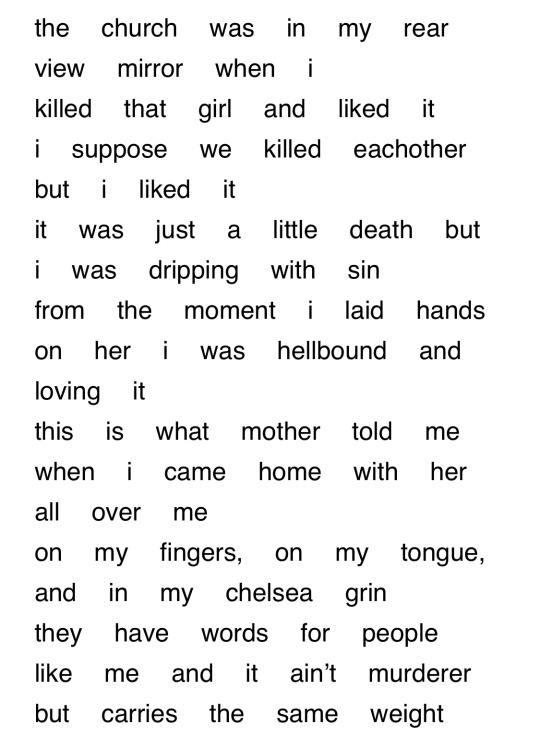
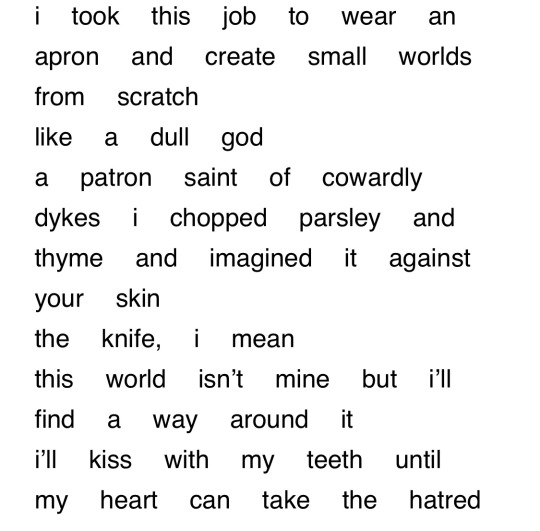
anthem for the modern lesbian by salem m. s.
kofi
2K notes
·
View notes
Text
Today’s poem is Orpheus in Hell by Jack Spicer. Here is the link. I hold the story of Orpheus and Eurydice very close to me, personally. I told my friend the other day, after sharing this poem with them, that sometimes being queer and in love with another queer person feels like Orpheus and Eurydice. You know how the story ends, but you love in spite of it.
0 notes
Text
Colonizers write about flowers. I tell you about children throwing rocks at Israeli tanks seconds before becoming daisies. I want to be like those poets who care about the moon. Palestinians don’t see the moon from jail cells and prisons. It’s so beautiful, the moon. They’re so beautiful, the flowers.
— Noor Hindi, from “Fuck Your Lecture on Craft, My People Are Dying,” DEAR GOD. DEAR BONES. DEAR YELLOW.
12K notes
·
View notes
Text
I think… I should write some bits of poetry tomorrow about being a bleeding heart. Making this post in vain because I want to remember.
0 notes
Text
I just read Relics by Matthew Shenoda. Here is the link. This one makes me feel things but I have no idea what. I can’t tell if I don’t know what I’m feeling because I’m a bit sleep deprived or if it’s just really that hard to pin down.
My favorite part of this poem:
We are a memory shaped by vertebrae / Clappers of rhythm disassembled by the / skeletons of time / We are the dissipating by the skeletons of time / We are the dissipating cartilage of our great- / grandchildren's memory holding to their / sockets by a sinew of hope
Thinking of maybe doing a dramatic reading of this poem… except I still don’t really know how to do dramatic readings.
0 notes
Text
Today I read Nocturne by Li-Young Lee. Here is the link.
Can’t get over the line “a creaking and groaning / of bone-growth, or body-death, marriages of / rust,”
It is just so… something. Certainly a way with words. It puts into words the way that sometimes the night air smells just a bit different, and everyone knows to stay in bed. I love it.
0 notes